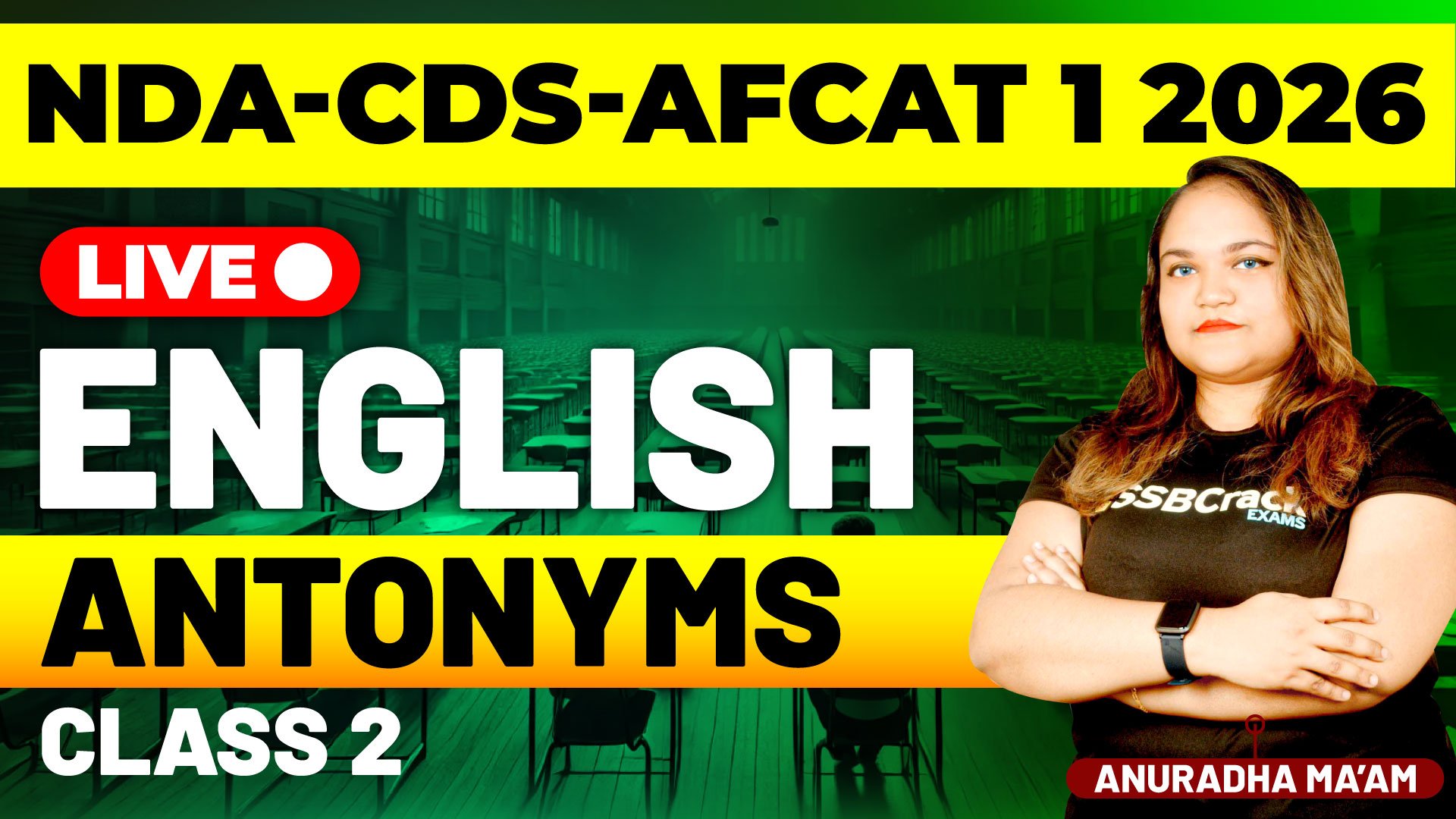The English Live Class 2 on Antonyms for NDA, CDS & AFCAT 1 2026 continued the vocabulary-building journey from the first session, taking aspirants a step closer to mastering one of the most scoring areas of Defence English papers.
This class focused on exam-level multiple-choice questions (MCQs), deeper contextual understanding, and word sense development — all crucial for excelling in vocabulary-based sections.
Antonyms play a vital role in Defence exams as they test not just memorization but the candidate’s logical ability to interpret language, understand nuances, and select the most contextually appropriate opposite word.
Importance of the Antonyms Topic in Defence Exams
- Consistent Exam Appearance:
Every year, NDA, CDS, and AFCAT papers feature 2–4 questions based on antonyms. These are direct, quick-to-solve, and highly scoring when practiced well. - Enhances Comprehension Skills:
Antonym knowledge improves your understanding of Reading Comprehension, Cloze Test, and Sentence Completion questions, which rely on vocabulary strength. - Develops Analytical Thinking:
Choosing the correct antonym requires analyzing tone, intensity, and connotation — sharpening your verbal reasoning skills. - Improves Written & Spoken Expression:
Learning antonyms helps you use contrasting ideas clearly in essays, interviews, and communication — reflecting clarity of thought, an essential Officer-Like Quality (OLQ). - Quick Marks, High Value:
Since antonym questions take less than 30 seconds each, they offer one of the best accuracy-to-time ratios in the English section.
MCQs Covered During the Class
This session featured a wide variety of MCQs inspired by previous years’ NDA, CDS & AFCAT question patterns. Each question was discussed in depth with explanations, usage examples, and smart memorization tips.
Here are some of the important Antonym MCQs covered in class:
- Abundant – (a) Scarce (b) Plenty (c) Overflowing (d) Sufficient
✅ Correct Answer: Scarce - Confident – (a) Shy (b) Nervous (c) Afraid (d) Weak
✅ Correct Answer: Nervous - Cautious – (a) Careful (b) Reckless (c) Alert (d) Wise
✅ Correct Answer: Reckless - Genuine – (a) Artificial (b) Fake (c) False (d) Duplicate
✅ Correct Answer: Fake - Ignorant – (a) Learned (b) Unaware (c) Naive (d) Indifferent
✅ Correct Answer: Learned - Miserly – (a) Greedy (b) Generous (c) Wealthy (d) Noble
✅ Correct Answer: Generous - Rigid – (a) Flexible (b) Stiff (c) Strict (d) Hard
✅ Correct Answer: Flexible - Transparent – (a) Clear (b) Opaque (c) Bright (d) Shiny
✅ Correct Answer: Opaque
Each word was broken down into meaning, antonym clusters, and examples in context, enabling aspirants to link the new words with previously learned vocabulary.
Class Highlights
- Advanced MCQs Practice: Focused on moderate to high-difficulty words often seen in CDS and AFCAT.
- Word Sense Development: Explained tone and context behind each word to understand true opposites.
- Memory Retention Drills: Engaged students with quick recall rounds and elimination-based exercises.
- Link Learning Technique: Connected antonyms to synonyms and related expressions for better recall.
Techniques Discussed for Mastering Antonyms
- Root Word Method:
Identify common prefixes and suffixes that alter meaning — e.g., honest ↔ dishonest, capable ↔ incapable. - Contextual Understanding:
Don’t just memorize — always check how the word behaves in a sentence to choose the most suitable antonym. - Visual Learning:
Create mental images for opposite ideas — e.g., dark ↔ light, empty ↔ full, rise ↔ fall. - Regular Reading Habit:
Daily reading of newspapers and Defence magazines builds exposure to high-frequency vocabulary naturally used in exams. - Synonym–Antonym Pairing:
Build word families — e.g., courageous ↔ timid, humble ↔ arrogant, expand ↔ contract.
Exam Perspective
In NDA & CDS, antonyms are generally direct vocabulary-based MCQs where aspirants need to identify the closest opposite meaning.
In AFCAT, the difficulty rises slightly — antonyms are often used in contextual sentences, demanding better comprehension.
Hence, consistent practice and familiarity with exam-style questions are key to mastering this area. Aspirants who dedicate 10–15 minutes daily to vocabulary practice find this section the most rewarding in terms of marks.
Key Takeaways from Class
- Understand meanings before memorizing opposites.
- Revise word lists and antonym pairs weekly.
- Practice MCQs from previous year papers.
- Maintain a vocabulary notebook with meanings, synonyms, and antonyms.
- Use new words in daily conversation for long-term memory.
Conclusion
The English Live Class 2 on Antonyms strengthened students’ grasp of vocabulary through interactive learning and concept-based MCQs. By focusing on application, context, and reasoning, aspirants not only enhanced their word knowledge but also developed verbal clarity and accuracy, essential to perform well in Defence English papers.
A strong vocabulary reflects an officer’s ability to communicate precisely and think critically — traits highly valued in the Armed Forces.
With regular practice, smart revision, and active learning, mastering Antonyms becomes an achievable and highly scoring goal in the journey toward success in NDA, CDS & AFCAT 1 2026.







